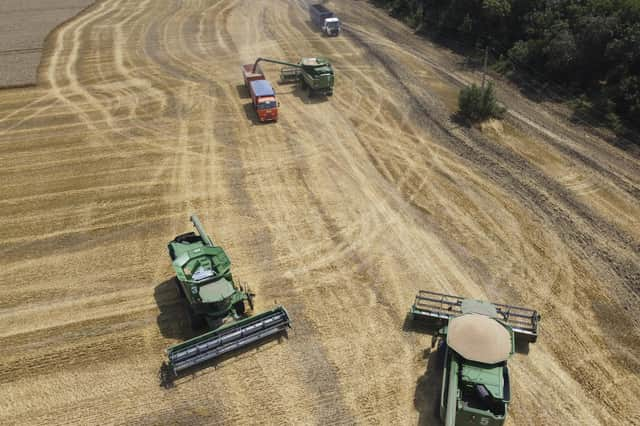Russian invasion raises fears over world grain prices


With supplies from both countries likely to be hit by the military action and geo-political turmoil, experts said that the regions had been expected to account for almost a third of all worldwide wheat shipments this year - while also accounting for significant levels of trade in maize and sunflower oil exports, with considerable volumes of all three yet to be shipped this season.
As a result of the disruption, wheat markets jumped markedly on Thursday, peaking at record highs of £260/t for May – but while they ended the day at closer to £245, this figure was still up over £10 on the day and £23 on the week.
Advertisement
Hide AdAdvertisement
Hide AdAlthough the decline seen later in the day continued on into Friday as some of the initial panic wore off, trade figures showed that while it was difficult to look beyond the Russia/Ukraine conflict, world stocks stood at historic lows – and the knock on consequences for Ukraine’s 2022 harvest and a continuation of the ban on Russian wheat exports could lead to further shortfalls.
However, commentators stressed that the invasion was also likely to have significant impacts on agriculture well beyond the global grain and oilseed trade and prices – stating that they could substantially increase already high costs for UK farmers for the 2022 crops through even higher fuel and fertiliser prices
The strong rise in Brent crude oil prices swiftly converted into increases in diesel at the pumps - with the red variety following suit, up a reported 5p a litre over the course of the day. And while orders for delivery next week were still being taken, many distributors were unwilling to commit to a price, with the markets at levels of volatility last seen during the Gulf War.
And with a jump of around 30 per cent in natural gas prices putting the price of futures contracts back to their highest levels since just before Christmas, it was predicted that this would also push nitrogen fertiliser prices up well beyond their already record levels.
Industry pundits also claimed that higher prices or reduced supply from Russia – which accounts for a significant proportion of ammonium nitrate, urea and other nitrogen fertiliser manufacture - would make things even more difficult for anyone yet to buy or take full delivery of their fertilise, with many UK suppliers and merchants withdrawing from the market.
“Ukraine is a producer and major supplier of ammonia, but more worryingly to most, Russia is the world’s number one exporter of ammonium nitrate, urea ammonium nitrate (UAN), ammonia and urea,” said Callum Finlay of ADM Agriculture.
He also said that the cancellation of the Nord Stream 2 certification seen earlier this week would see all energy costs entering a period of much uncertainty.
Finlay added that with supplies in the UK being already tight and with deliveries behind where they would normally be entering March, all pricing looked set to move higher.
Comments
Want to join the conversation? Please or to comment on this article.